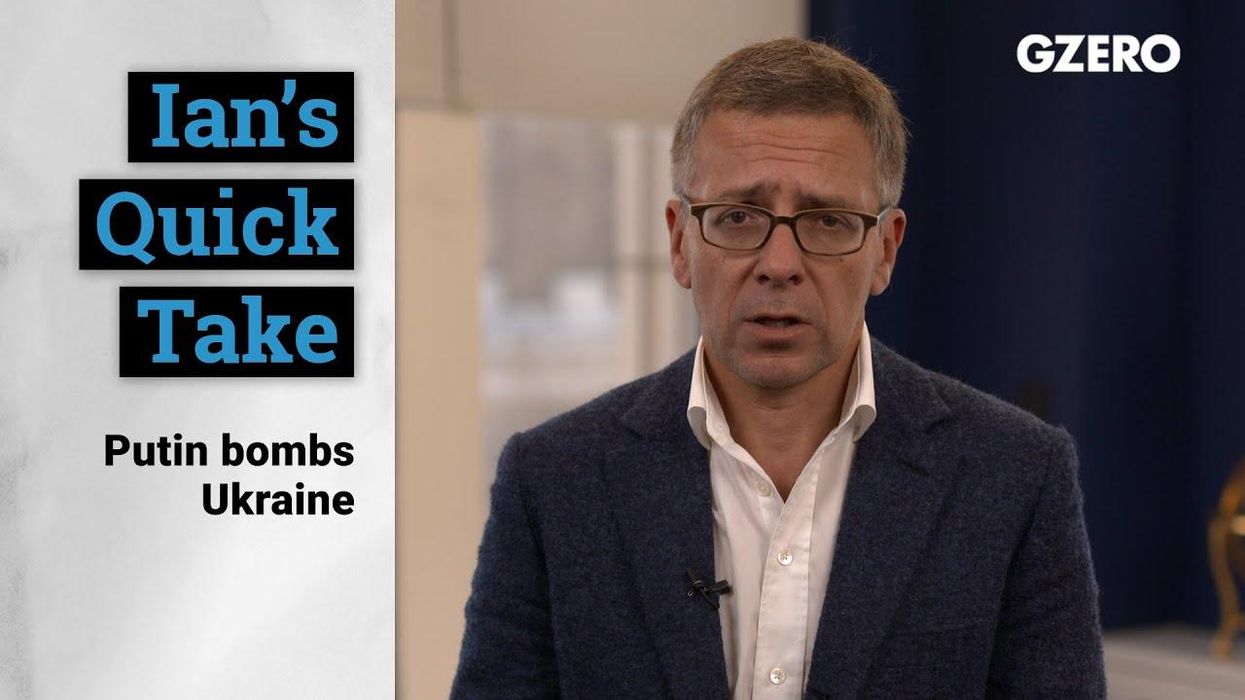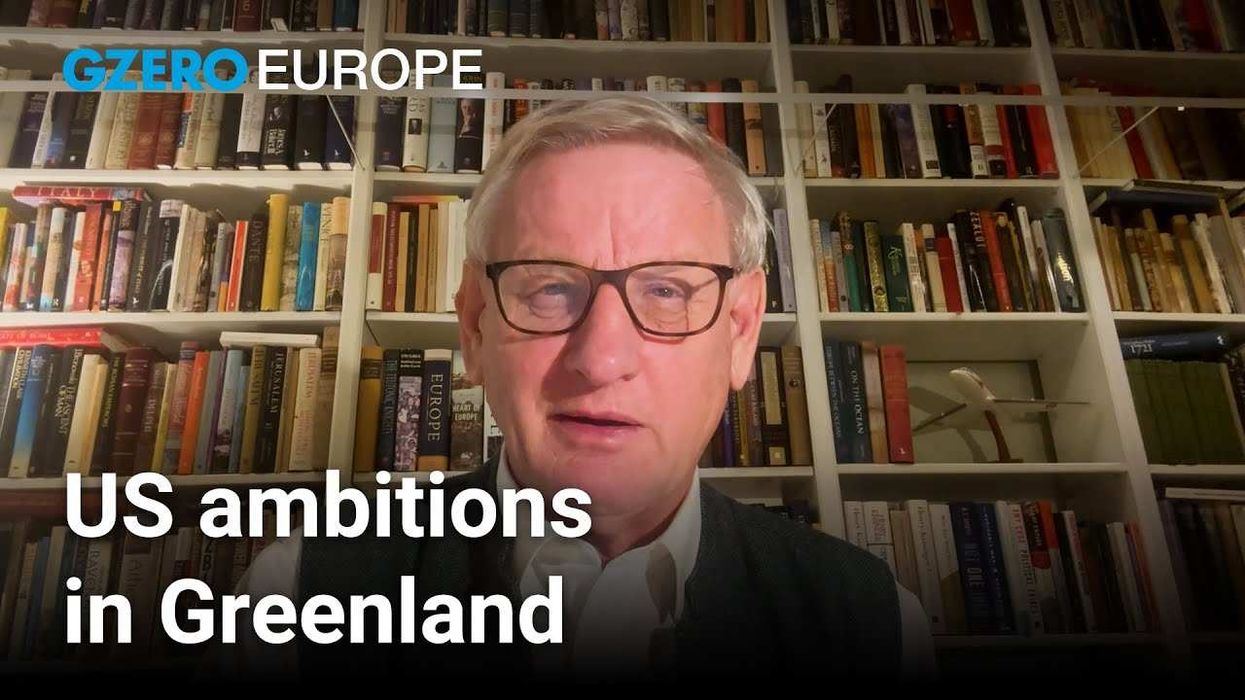VIDEOSGZERO World with Ian BremmerQuick TakePUPPET REGIMEIan ExplainsGZERO ReportsAsk IanGlobal Stage
Site Navigation
Search
Human content,
AI powered search.
Latest Stories
Sign up for GZERO Daily.
Get our latest updates and insights delivered to your inbox.
Global Stage: Live from Davos
WATCH
Ian Bremmer's Quick Take: Hi everybody. Ian Bremmer here. A happy Monday to you. A Quick Take, again, turning to the war in Russia. Lots going on, almost all of it escalatory at this point. Most recent state of play, a spectacular attack by the Ukrainians on the Kerch Bridge, the Crimea bridge that was said by Putin to be impregnable, can't possibly be able to attack it. It was providing a lot of supply chain, military supply chain from Russia sourcing capabilities material into Crimea and the rest of Ukraine, and suddenly significantly disrupted by a Ukrainian truck bomb.
That led Putin to respond in the early hours today, rush hour in Ukraine. Indiscriminate attacks against all of Ukraine's major cities. Nearly 100 bombs, civilian targets, killing lots of Ukrainians. An act of state terrorism on the part of Russia. On the one hand, absolutely horrifying that the Ukrainians are living through the kind of attacks in recent years that we've only seen in Aleppo in Syria, in Grozny, by the Russians in early post-Soviet days, and now seeing it across Ukraine.
War crimes, yet again. Acting with impunity in terms of Russia's complete indifference to how the rest of the world sees him and reacts to him. Having said all of that, part of the reason why we're seeing state terrorism from Putin is because he does not have conventional capabilities to respond to the Ukrainian counter offensive, which continues to eat up territory, Ukrainian territory, that they are retaking from the Russian occupation, significantly in Kherson which is north of Crimea, but if the Ukrainians are able to take it, that would disrupt yet another key supply chain of Russia to Crimea.
Then finally, Zaporizhzhia, which is the land bridge between Russian and Crimea, you get all three and the Russians can mobilize all they want. They can't get troops to Crimea. They can't get troops to the South. This war continues to go badly for the Russians. The Russians continue to try to make the Ukrainians pay. The Ukrainians, of course, have extraordinary support from all of NATO. That continues. Russia's willingness to take these acts against the Ukrainians is only going to harden the resolve of NATO countries to continue to provide direct military support to Ukraine, and even to increase the levels of, say, air defense, missiles, and the like to defend themselves and also to be able to counterattack.
The next few months we are looking primarily at Ukrainian counteroffensives to take as much territory from the February 24th lines as they can. The Russians trying to get their troops in as quickly as they can to hold some of that territory. That's basically what's playing out. Beyond that, the big question is whether or not the Russians are going to take asymmetric attacks against NATO. If you watch this conflict played out from Russian state media and how Putin is portraying it to his people, it's that they are losing territory and they admit to losing territory. They're losing the bridge. They admit to losing the bridge, at least for a brief period of time, because of attacks from NATO. This isn't just Ukraine, it's all the intelligence. It's all the ordinance. It's all the money. It's all the training. They're fighting against NATO.
Well, are they going to do anything against NATO? So far what they've been doing is only against Ukraine. And the ability of the Russians to engage in asymmetric attacks against fiber attacks, cyberattacks, pipeline attacks, critical infrastructure attacks, things that the Europeans need to be able to function as normal economies, and yet well short of weapons of mass destruction on the ground in Ukraine. If the Russians were to take steps like that, how might NATO respond? That is, I think, a big question that the European leaders are asking themselves and we don't have a clear answer for. I do expect that over time, especially as it is clear that Russia's economic stranglehold on energy for the Europeans is increasingly not going to make a difference in terms of NATO response, that Putin has to think about what else he can do.
Suing for peace does not appear to be in his playbook at this point. The other thing I would say is watch carefully the Chinese, the Indians, other countries that have been more supportive or at least more willing to be on the sidelines for Putin, increasingly are being outspoken and saying they want an immediate ceasefire. They want the Russians to stop this war. Putin has been ignoring them thus far. Will he continue to, and will those countries be willing to make Russia pay any cost themself? So far they have not. That may change.
One disturbing side, we have coming up very soon in the General Assembly, a global vote that will be taken about condemning the Russian annexations of the four Ukrainian territories. That will easily pass, but it looks like the number of positive votes are going to be around 100, 110. In other words, very large numbers of abstentions from the majority of the developing world. That continues to be the story here. That because Ukraine is being treated so differently as a conflict by the West than other invasions, illegal invasions in other parts of the world, where the West would normally say, "We want a ceasefire and then we'll see what we do."
Here, the West isn't calling for a ceasefire. The West is saying it's an illegal invasion, and so the Ukrainians need to be supported to take their land back. That hypocrisy, certainly that level of lack of alignment in the way the West treats Ukraine compared to other parts of the world, is leading the developing world to say we want very little part of this crisis. To the extent that Putin is increasingly seen as a war criminal globally, is involved in terrorist activities that other states would not be allowed to get away with, that of course is going to increase pressure on the developing world to get on-side publicly on this issue. Puts more pressure on Putin, too.
That's state of play right now. I still am someone who thinks that nuclear weapons, of course, are something to be worried about because Russia has lots of them and because they're in a tough position, but the likelihood of being used or being used soon in my view is still very, very low indeed. Higher than at any point since 1962. The Cuban Missile Crisis. I wasn't around for that. I don't want to be around for this, but let's hope we can avoid it.
For more of Ian Bremmer's weekly analyses, subscribe to his GZERO World newsletter at ianbremmer.bulletin.comKeep reading...Show less
More from Quick Take
Europe takes control of Ukraine’s future
December 15, 2025
Trump’s new national security strategy targets Europe
December 08, 2025
Trump, Russia, and a deal Ukraine can’t accept
December 02, 2025
Europe divided as US pushes Ukraine-Russia peace deal
November 24, 2025
Trump escalates sanctions against Russia
November 10, 2025
Is Abu Dhabi becoming the global capital of AI development?
November 02, 2025
What the Trump-Xi meeting means for US-China relations
October 30, 2025
Trump’s East Wing demolition, Binance pardon, and tariffs on Canada
October 27, 2025
Trump brokers peace: Hostages freed and guns fall silent in Gaza
October 13, 2025
Trump's role in brokering Israel-Hamas deal
October 09, 2025
America’s short-term wins vs. long-term risks
October 06, 2025
Israel is facing real consequences over Gaza annexation plans
September 29, 2025
Is Israel risking global isolation over Gaza?
September 22, 2025
Charlie Kirk's assassination will make things worse in the US
September 15, 2025
Russia-Ukraine war escalation
September 08, 2025
China’s push for a new world order
September 02, 2025
Is the US preparing to strike Venezuela?
August 27, 2025
Is American capitalism still capitalism?
August 25, 2025
Zelensky, Trump, and NATO: A united front on Ukraine?
August 18, 2025
Trump and Putin to meet in Alaska to discuss Ukraine
August 11, 2025
US government rescinds West Point role for former cyber director
August 04, 2025
US-EU trade deal marks a win for Trump
July 28, 2025
The US, China, and the critical minerals question
July 21, 2025
Epstein conspiracies divide Trump's MAGA base
July 14, 2025
US-Brazil relations in crisis
July 10, 2025
Elon Musk vows to start a new political party
July 07, 2025
What Zohran Mamdani’s win really signals for US politics
June 30, 2025
Iran's retaliation shows strategic weakness
June 23, 2025
US enters war with Iran: What comes next?
June 22, 2025
Iran looks to negotiate ceasefire
June 16, 2025
Elon vs. Trump: Billionaire fallout goes public
June 06, 2025
Elon Musk steps down from Trump administration
May 29, 2025
Trump's weekend of geopolitical success
May 12, 2025
Can Trump and Carney reset US-Canada relations?
May 07, 2025
Trump’s ‘less is more’ message is un-American
May 05, 2025
Ian Bremmer on Trump's first 100 days
April 28, 2025
Trump’s America: A kleptocracy but not a police state
April 23, 2025
Inside the Harvard-Trump showdown
April 21, 2025
Can the US win by undoing globalization?
April 14, 2025
Who benefits from Trump's tariff wall?
April 07, 2025
Trump's tariffs & the end of globalization
April 03, 2025
Leaked Signal chat shows Trump team's mindset
March 26, 2025
What Trump team's war plans leak revealed
March 25, 2025
Is Europe in trouble as the US pulls away?
March 24, 2025
Putin-Trump Ukraine call is a small win for both sides
March 18, 2025
What will Trump offer Putin in Ukraine ceasefire talks?
March 17, 2025
Ukraine ceasefire deal now awaits Putin's response
March 11, 2025
Can Europe broker a Ukraine ceasefire?
March 03, 2025
What Trump-Zelensky fallout means for Ukraine war
March 01, 2025
Why the US-Ukraine minerals deal changed
February 26, 2025
Germany's close election limits its ability to lead Europe
February 24, 2025
Ukraine hopes for Europe's help as US negotiates with Russia
February 18, 2025
JD Vance stuns Munich conference with critique on European democracy
February 14, 2025
Trump-Putin chat over Ukraine "deeply" worries Europe
February 13, 2025
What is Trump's Gaza playbook?
February 10, 2025
Why cutting USAID will hurt American foreign policy
February 05, 2025
Why is Trump starting a trade war with Canada?
February 02, 2025
How Trump's assertive foreign policy impacts international relations
January 27, 2025
Trump's Davos address sets up big shifts in US strategy
January 24, 2025
From Davos: How global leaders are grappling with Trump’s return
January 20, 2025
Ian Bremmer on the forces behind the geopolitical recession
January 17, 2025
What Greenlanders might want from a deal with Trump
January 13, 2025
New Year's Day terror attacks highlight America's divisions
January 03, 2025
GZERO Series
GZERO Daily: our free newsletter about global politics
Keep up with what’s going on around the world - and why it matters.















































































